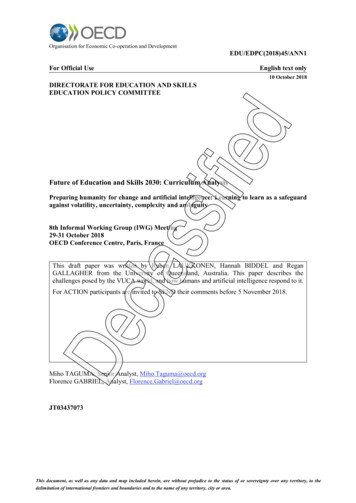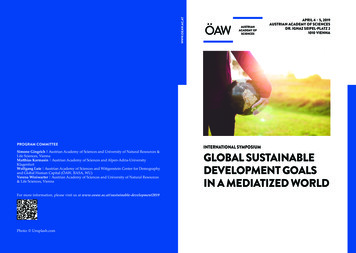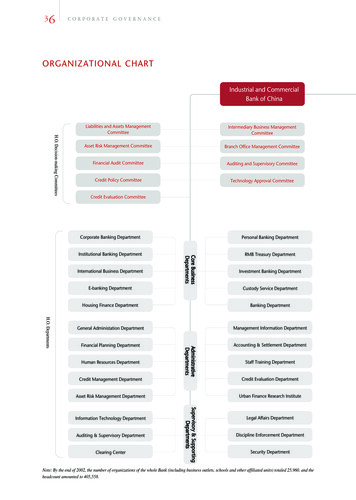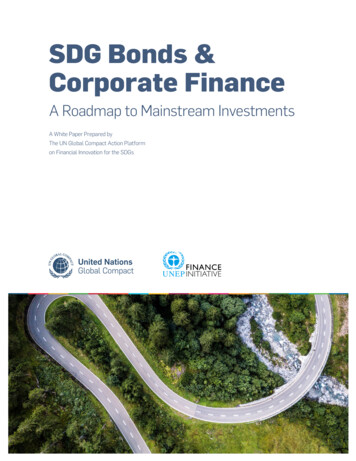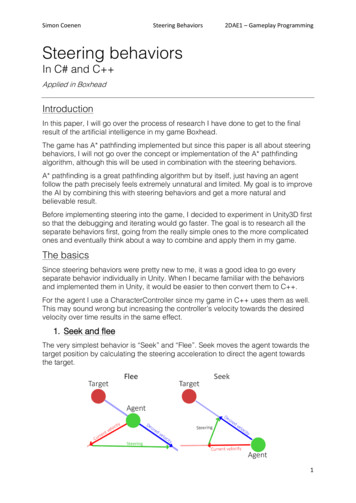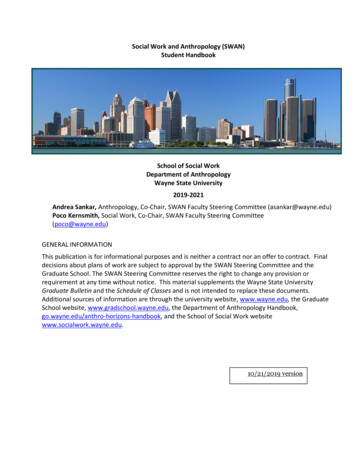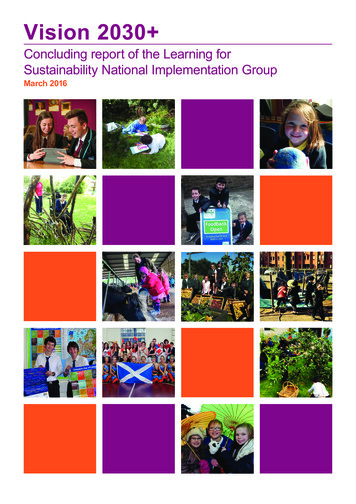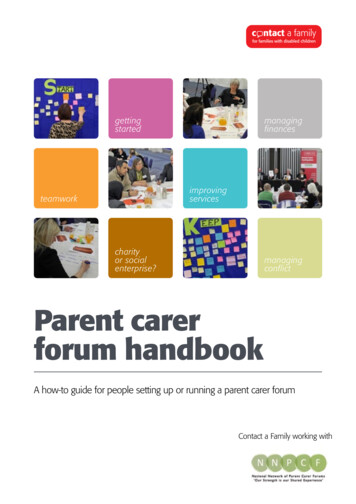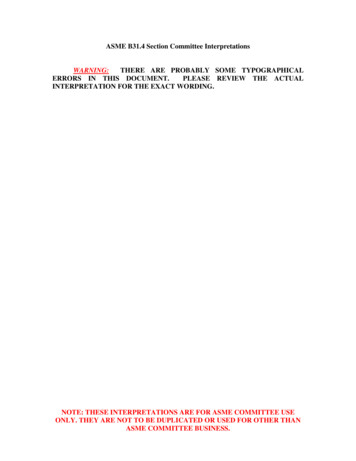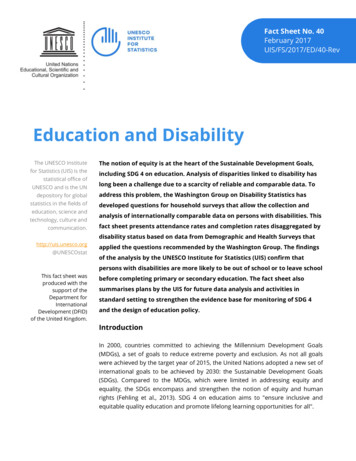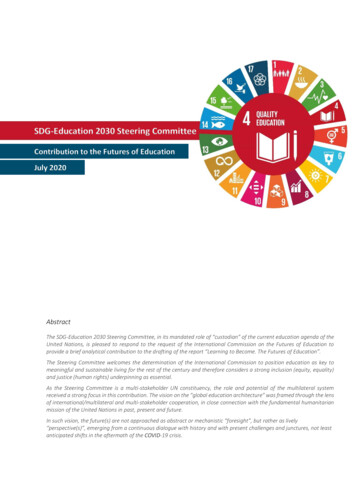
Transcription
SDG-Education 2030 Steering CommitteeContribution to the Futures of EducationJuly 2020AbstractThe SDG-Education 2030 Steering Committee, in its mandated role of “custodian” of the current education agenda of theUnited Nations, is pleased to respond to the request of the International Commission on the Futures of Education toprovide a brief analytical contribution to the drafting of the report “Learning to Become. The Futures of Education”.The Steering Committee welcomes the determination of the International Commission to position education as key tomeaningful and sustainable living for the rest of the century and therefore considers a strong inclusion (equity, equality)and justice (human rights) underpinning as essential.As the Steering Committee is a multi-stakeholder UN constituency, the role and potential of the multilateral systemreceived a strong focus in this contribution. The vision on the “global education architecture” was framed through the lensof international/multilateral and multi-stakeholder cooperation, in close connection with the fundamental humanitarianmission of the United Nations in past, present and future.In such vision, the future(s) are not approached as abstract or mechanistic “foresight”, but rather as lively“perspective(s)”, emerging from a continuous dialogue with history and with present challenges and junctures, not leastanticipated shifts in the aftermath of the COVID-19 crisis.
SDG-Education 2030 Steering CommitteeTable of ContentExecutive summary . 31.The aftermath of the COVID-19 pandemic . 32.Future(s)? . 33.Making the futures of education more concrete. 34. Educational cooperation in the future: innovative pathways for multilateralism, internationalsolidarity and engagement of stakeholder organisations . 4Conclusion . 5Introduction . 6A targeted contribution . 6 shaped by the experience in multilateral and multi-stakeholder cooperation . 61. The aftermath of the COVID-19 pandemic . 7The immediate perspective . 7Medium and long-term perspective . 112. Future(s)?. 13Future(s) in a vision of continuity and renewal . 13Re-enacting the initial human rights-based inspiration of the founding of the United Nations: theRight to Education . 14How to define the Right to Education in a future-proof way? . 143. Making the Futures of Education more concrete . 14A holistic approach to the Right to Education . 14 requires policies that provide the framework conditions to let the multiple missions ofeducation flourish . 154. Educational cooperation in the future: Innovative pathways for multilateralism,international solidarity and engagement of stakeholder organisations . 19With regard to the overarching vision . 20With regard to the perspective . 20With regard to commitments and responsibilities in the multilateral system and the “globaleducation architecture” . 20Conclusion . 212Contribution to the Futures of Education
SDG-Education 2030 Steering CommitteeExecutive summary1. The aftermath of the COVID-19 pandemicThe COVID-19 pandemic has magnified the long-standing functional deficiencies and profoundinequalities in our societies. On the other hand, it was also a catalyst for educational institutionsworldwide to come up with innovative solutions in a relatively short period. This brief momentum ofawareness should be seized in preparing our societies for a better and sustainable future.The SDG-Education 2030 Steering Committee reinforces its call on the international community torenew its commitment to the universal 2030 Agenda for Sustainable Development and make it theconduit of all policies. This implies increased attention to inclusion, equality and equity, as well asrelevance and quality in education, alongside a thorough reflection on how to put internationalsolidarity and multilateralism back on track.In the immediate context safeguarding the Right to Education calls for an urgent response.In a medium and long-term perspective, re-thinking of educational innovation and the particular roleof ICT herein in terms of inclusion and quality, remains of continuous relevance, with human dignityand fostering a culture of trust as overarching principles.The UN mandated multilateral and multi-stakeholder Global Education Meetings, convened byUNESCO and prepared by the SDG-Education 2030 Steering Committee, could provide strongerpolitical traction for shaping resilient, future-proof and adequately funded education.2. Future(s)?How to define the Right to Education in a future-proof way?Our futures contain all we hope to transmit to future generations, but also that what (we) will change– be it renewed or transformed. How to make confident use of promising new developments andopportunities to the benefit of education for now but also in mid-term and long-term perspective?We should look at what we consistently aspire for education from the past, today and in the future,and how this vision can empower future generations to take active responsibility for the advancementand development of society at all levels.The SDG-Education 2030 Steering Committee, as an international political, multi-stakeholder forum,suggests endeavouring in the re-actualisation of the vision of the UN to the world of today andtomorrow from the angle of the Right to Education.3. Making the futures of education more concreteThe SDG-Education 2030 Steering Committee reiterates its previous core messages on equity, equalityand inclusion, as well as on relevance and quality of education. For its achievement, it points atframework conditions for good governance (stakeholder involvement in co-creation of policies andaccountability mechanisms, funding and investment in education, lifelong learning perspective,gender mainstreaming ).This strategy must be oriented by a multifaceted view on the mission of education and a humanisticapproach to learning. This encompasses the recalibration of learning for the post-2030 period with apivotal role for SDG4.7 (education for sustainable development and sustainable lifestyles, humanrights, (gender) equality, culture of peace and non-violence, democratic citizenship in a global context,appreciation of cultural diversity ) and the triangular relation between education, culture andscience.3Contribution to the Futures of Education
SDG-Education 2030 Steering Committee4. Educational cooperation in the future: innovative pathways for multilateralism,international solidarity and engagement of stakeholder organisationsThe SDG-Education 2030 Steering Committee calls for innovative pathways to re-vitalise multilateraland multi-stakeholder cooperation and international solidarity in education, and points at frameworkconditions to reach this goal in a coherent way, starting from a shared vision and the politicaldetermination as well as financial commitment of all nations to realise it. In doing so, the holisticapproach to the Right of Education remains the guiding principle for multilateralism in education todayand in future. Against this backdrop, 10 actionable recommendations are suggested to makemultilateral and multi-stakeholder cooperation in education work.With regard to the overarching visioni.A broad - humanistic - vision on education, encompassing all missions of education (personaldevelopment and fulfilment, employment, democratic participation, advancement of theknowledge base of society) with room for interplay of education, research and science, cultureand creativity;ii.A broad – social – vision on education under a consistent lifelong learning perspective, andwith no trade-offs between efficiency/quality, on the one hand, and equity/equality/ inclusion,on the other, and addressing psycho-emotional wellbeing and development of learners in aperspective of community building;iii.Connection of the educational agenda to the advancement of the global community as a whole(balance between social, economic and ecological pillars of the 2030 Agenda for SustainableDevelopment) and leaving room for inter-sectoral action and the interconnection betweensustainable development and respect for human rights and the core values of the UN: peaceand non-violence, human rights and justice, development and wellbeing;With regard to the perspectiveiv.Long-term perspective of policy-making, investment and planning, geared at sustainabilityinstead of quick wins, and beyond exclusive focus on output data, large-scale learningassessments and other standardised tests; in contrast - widening the attention to theembedding processes and framework conditions, and moreover, trusting the judgment ofexperts and professionals as well as that of learners, and notably youth that hold the promiseof the futurity of our society;v.Continuity in perspective (“The future is now”). Follow-up of advancement should focus onthe progressive reduction of inequalities over time at the local, national, regional and globallevel, and links with international human rights mechanisms should be strengthened;vi.Perspective of a changing world. Realisation that the world of today and tomorrow is differentfrom that at the time of the founding of the UN in 1945. Anticipation on geopolitical trends,including prospects on evolution of equality/equity in the light of data-driven and “borderless”economies and education provision;With regard to commitments and responsibilities in the multilateral system and the“global education architecture”vii.Political and financial commitment and responsibility of all national Governments of the worldto multilateral and multi-stakeholder cooperation/solidarity in education, coupled with trustin scientific and professional expertise and knowledge-sharing;viii.Reinforcing UNESCO as multilateral agency dedicated to education, adequately funded andequipped to perform a clear coordinating mandate in the global education architecture, in4Contribution to the Futures of Education
SDG-Education 2030 Steering Committeedialogue with other UN agencies, as well as in complementarity with other international andregional organisations, and with delineated responsibilities for its decision-making bodies, inwhich all nations participate in the steering/dialogue – membership at the level of the UNshould automatically entail membership of its main agencies (such as UNESCO) as well;ix.Clear procedures for coherent collaboration and division of labour between the national,regional and global level with meaningful involvement of representative organisations ofstakeholders (partners in education) and civil society, while acknowledging the value of theiron-the-field experience for designing and implementing local, national and internationalpolicies;x.Provision of leadership, both at national and international level, by Governments, whilemaintaining dialogue with NGOs, and notably with representative organisations of partners ineducation and civil society, to ensure that education policies and practices lead to inclusion,meet quality standards and are aligned with other sectoral policies geared at social inclusion.Governments should also create conditions enabling NGOs to monitor fulfilment ofgovernmental commitments in national and international context and stand up for thoseexcluded from education.ConclusionThe 2030 Agenda for Sustainable Development and notably the Education 2030 Framework for Actioninclude a vision on the empowerment of future generations to assume active responsibility for theadvancement and development of society at all levels from the perspective of the Right to Education.Thinking of 2050, efforts should be diversified and strengthened in this sense.5Contribution to the Futures of Education
SDG-Education 2030 Steering CommitteeIntroductionA targeted contribution The SDG-Education 2030 Steering Committee, in its mandated role of “custodian” of the currenteducation agenda of the United Nations, is pleased to respond to the request of the InternationalCommission on the Futures of Education to provide a brief analytical contribution to the drafting ofthe report “Learning to Become. The Futures of Education”.The Steering Committee welcomes the determination of the International Commission to positioneducation as key to meaningful and sustainable living for the rest of the century and thereforeconsiders a strong inclusion (equity, equality) and justice (human rights) underpinning as essential.In a concern of delivering a contribution that is genuinely helpful for the International Commission’sdrafting work, advice was sought from UNESCO’s Futures of Education Team in confining the specificrole of the Steering Committee in the consultation process.The Steering Committee has followed the suggestion to take the critical assessment of internationalcooperation in education as overarching perspective and therefore:oRefrained from duplicating the thematical/topical work of the Commission’s experts butrather approached the factors that shape the educational environment now and in the futureunder the political and multi-stakeholder perspective of global cooperation and interaction.oAvoided overlaps with the parallel processes of (1) national reactions to the consultation onthe Futures of Education and (2) discussions between members of the InternationalCommission themselves.Nonetheless the contribution of the Steering Committee should be read in dialogue with the Visioningand Framing the Futures of Education document, as intermediate synthesis of the discussions of thefirst meeting of the International Commission on the Futures of Education in its preparation of thefinal report “Learning to Become. The Futures of Education”. This important milestone is indeed dueto guide all contributions to further work on the Futures of Education.As further canvas to their own reflection the Steering Committee has moreover made good use of theInternational Commission’s Joint Statement and statements of individual Commission members inresponse to the COVID-19 crisis on Protecting and Transforming education for shared futures andcommon humanity (May 2020) and of the most recent publication of the International CommissionEducation in a post-COVID world: Nine ideas for public action (June 2020). shaped by the experience in multilateral and multi-stakeholder cooperationAs the Steering Committee is a multi-stakeholder UN constituency, the role and potential of themultilateral system received strong focus in this contribution. The vision on the “global educationarchitecture” was framed through the lens of international/multilateral and multi-stakeholdercooperation, in close connection with the fundamental humanitarian mission of the United Nations inthe past, present and future.In such vision the future(s) are not approached as abstract or mechanistic “foresight”, but rather aslively “perspective(s)”, emerging from a continuous dialogue with history and with present challengesand junctures, not least anticipated shifts in the aftermath of the COVID-19 crisis.6Contribution to the Futures of Education
SDG-Education 2030 Steering Committee1. The aftermath of the COVID-19 pandemicThe immediate perspectiveA short momentum for action The Futures of Education work started before the outbreak of the COVID-19 pandemic, which in itselfis the perfect illustration of the inherent unpredictability of the future. In-depth understanding andinterpretation of the current situation remains key to realistically address challenges for now and forthe future.Nonetheless, it is not unreasonable to assume that COVID-19 could become the largest worldencompassing human tragedy after World War II. Apart from grievance over the human losses, wecan expect that the social divide and inequalities – most painfully visible in the areas of health-care,education, social protection and general living conditions in our communities under confinement - willeven exacerbate in the aftermath of COVID-19 and the ensuing period of economic recession.From a global perspective, the International Commission on the Futures of Education should however,remain critical to the current narrative of the COVID-19 crisis as an “unprecedented” moment thatannounces a new epoque in world history. As historians of epidemics will point out eloquently, thecurrent situation is by no means “exceptional”. Like with all pandemics, the most vulnerable groups inour society suffer the most, not only from the disease itself, but also from the confinement/quarantinemeasures. Throughout the centuries, major epidemics have always been followed by economic crisisand often accompanied by social unrest and upheavals, as well as public narratives of guilt andpenance. The almost disproportional media coverage for COVID-19 – to the detriment of attentionfor other humanitarian tragedies – undoubtedly also contains a flavour of self-centredness of regionsthat dwelled in the false presupposition that the advancement of their medical systems could preventthem from being hit by pandemics. The description of the fight against the Coronavirus in terms of a“war” by politicians, has been interpreted by several observers as a disgrace to those populations thatare living under the threat of a “real” war, i.e. coping with a violent conflict or other humanitariantragedy and therefore not even in the luxury position to protect themselves against this virus . Thehuge media attention to COVID-19 as well as the policy answers of confinement - imposed not onlyon COVID-19 patients but often also on the entire population - shows sharp contrast with the relativeindifference to other more virulent recent regional epidemics like Ebola and SARS, let alone therecurrent cholera outbreaks, of which the spreading is typically more local1.As societies tend to take their normal course very quickly once the pandemic is over, busy as they arewith other challenges, it is to be expected that momentum of the COVID-19 crisis to adapt our policies,will also be very brief. In this context, it can be of merit to couple the analytical reflection on theFutures of Education with actionable recommendations on how education can shape the future onthe canvas of the 2030 Agenda for Sustainable Development.1This analysis is based on a recent interview (28.04.2020) with historian and President of the Royal Belgian Society ofOriental Studies, Christian Cannuyer, who made the link between the history of pandemics in Europe to the currenthumanitarian situation in the Middle East: bution to the Futures of Education
SDG-Education 2030 Steering Committee. for critical questioning of current policies Several areas of policy-making that came into the spotlight during the COVID-19 confinement periodcall for revisiting. We already mentioned the exacerbating of the social divide, but there are otherexamples that may also inform recalibration of education for the future.Hierarchies and trade-offs in society, economics and in political decision making.What is a “vital sector” in a context of confinement of the population? Should we not re-orient studyoffer and professional guidance based on the current experience? How long can social life, economy,human rights, including right to education and work, psycho-emotional wellbeing, human dignity2 remain “between parentheses” for sanitary reasons? How to justify that in the design of exit strategiesfrom the lock-down, the Right to Education, that is in theory even guaranteed in times of violentconflict, does not automatically prevail in the current crisis? What is the (economic?) rationale behindthe fact that in many countries university students can gather freely in indoor shopping malls andcafés but are not allowed to enter their campuses?Confinement, social divide, deep inequalities and human rights3.How to prevent a sanitary crisis from turning into a crisis in democracy, human rights and rule of law?Apart from the confinement exacerbating social inequalities there is the upsurge of biometricalsurveillance, as a particular form of artificial intelligence, that might become instituted and start toserve less noble aspirations than just safeguarding the population’s wellbeing. In the long run thiscould hamper the empowerment of citizens to take responsibility for their own health (and life in thewider sense) and that of others4. How to prevent autocratic regimes, in the name of sanitary lockdown, impose undue restrictions on civil society in their democratic expressions and pro-peopleactions 5 , target political opponents or discriminate against specific (ethnic, cultural, religious )minorities6?Security, “evidence” and monitoringThe COVID-19 crisis has confronted us with the futility of the attempt to achieve absolute oversightand control over all aspects of human life and to prevent catastrophes by clinging to monitoringprocedures that select the correct (output) data. Even experienced scientists had to admit thatconfronted with an unknown virus, they were entering uncharted territory, causing their advice to2And even the rituals bringing the community together at the major stages in the lifecycle (birth, marriage, passingaway ). Seen from a humanistic perspective to education this is not a detail, since, as was so sharply observed in ChineseConfucian tradition but also in other world cultures, rituals are the gateway to (individual and collective) humanity.Fingarette, H. (1972), Confucius: The Secular as Sacred. Long Grove (Ill): Waveland Press, summarises this insight as“human community as holy rite”.3 Human Rights Watch, Human Rights Dimensions to Covid-19 Response, an-rights-dimensions-covid-19-response4Hence the strong insistence of the German Chancellor Angela Merkel in her TV address to the nation of 18.03.2020 thatthe confinement measures have to remain exceptional and temporary and her explicit reference in this regard to her ownyouth experience of living under a totalitarian regime. Also historian and futurologist Yuval Noah Harari (Hebrew Universityof Jerusalem) in his contribution The world after Coronavirus in the Financial Times of 20.03.2020 observes: “Asking peopleto choose between privacy and health is, in fact, the very root of the problem. Because this is a false choice. We can andshould enjoy both privacy and health. We can choose to protect our health and stop the coronavirus epidemic not byinstituting totalitarian surveillance regimes, but rather by empowering citizens. In recent weeks, some of the mostsuccessful efforts to contain the coronavirus epidemic were orchestrated by South Korea, Taiwan and Singapore. Whilethese countries have made some use of tracking applications, they have relied far more on extensive testing, on honestreporting, and on the willing co-operation of a well-informed public”.5UN OHCHR, States responses to Covid 19 threat should not halt freedoms of assembly and association, report of UNexpert Clément Voule, 14.04.2020.6As was mentioned at the launching of the Group of Friends on Solidarity and Inclusion with Global Citizenship Education,launched at UNESCO on 26.05.2020.8Contribution to the Futures of Education
SDG-Education 2030 Steering Committeeevolve according to what further research and experience revealed. Strangely enough, public opinioncontinued to display a preference for trusting incomplete, and therefore unreliable, data and figures,rather than having no figures at all7.Relation with nature and the planetThe pandemic has made visible the risks associated with current forms of production, humanconsumption and its consequences on climate change and the environment. We cannot nonethelessrely on a romantic view of nature as “paradise lost” that can simply be restored by living in harmonywith all planetary life. Humanity can destroy the planet but is also the only species that can take actionto save it. This is an important typically human responsibility that goes “beyond the human”.Nonetheless and to a certain degree, we will have to accept the inherent unpredictability of naturaldisaster, as experienced in the cruelty of an epidemic for which, despite the enormous advancementof science and technology, there is no immediate cure other than the human strength of mutualsupport in adversity. For this reason, it is necessary to build a new “normality” based on thetransformation of our ways of inhabiting the world, of relating among peoples, with cultures and in aresponsible relationship with nature.In summaryA thoughtful synthesis on how to re-orient our post-COVID policies in the spirit of the 2030 Agendafor Sustainable Development was given by the UNCTAD Director of globalisation and developmentstrategies, who points at policies that “promote equality at home and internationalism across theglobe. In our interdependent world, these measures will, however, prove insufficient without amultilateral system that promotes and protects the wellbeing of all people above short-term financialgains and the needs of itinerant international firms”8.This programmatic advise is of high relevance for education as well.Right to Education under attack?“The right to education is real and undiminished also in times of emergency, even if the ways in whichthis right is ensured may require adaptation. We cannot allow our fundamental values to be left at thewayside, as we have seen with attempts to sidetrack democracy, including such essential values asacademic freedom and institutional autonomy”9.7A literary evocation of this “control crisis” was given by the Dutch poet and novelist Ilya Leonard Pfeijffer, who wrotefrom his quarantine address in the Italian city of Genova: “Finally the graphs are doing what we wanted. We have given upeverything for it, our job and leisure, the contacts with our parents and friends and we have given up our fundamentalrights, our democracy and our future with only this one goal in mind: to regain control of the graphs. [ ]. We can questionall figures, but that was the case before and the unreliable figures of today are undeniably lower than the unreliable figuresof before. We told ourselves that we made sacrifices to save lives. We said to beat the virus. But that was not what it wasall about. It was about control. Since we have put God off duty and ripped his creation out of his hands, we have becomethe masters of our destiny. Life was makeable and we even control death to our will. Suffering was obsolete and happinesswas available on order. We tamed the capriciousness of chance, eliminated risks and strived for total control overeverything. One silly, microscopic virus shattered our illusion of control. That explained our panic and our outrageousreaction. We tried to regain control by putting everything we could think of under draconian control. We had to show thatwe were in charge” (De Standaard, 26.04.2020).8 KOZUL-WRIGHT, R. & BARBOSA, N. (2020): “This Crisis Will Change the World – for Better or Worse”, Tribune, king the right to education real in times of crisis, statement by Matjaž Gruben on the COE ontribution to the Futures of Education
SDG-Education 2030 Steering CommitteeThis recent statement of Matjaž Gruben, Director of Democratic Participation of the Council of Europe,in response to the COVID-19 crisis, is a strong reminder that without respect for human rights,democracy and rule of law, we cannot (re-)build societies in a sustainable way.This insight should also guide our re-thinking of hierarchies and priorities in education, that notablywith regard to the currently heavily debated transmission of (civic) values, require a solid frameworkt
Abstract The SDG-Education 2030 Steering Committee, in its mandated role of “custodian” of the current education agenda of the United Nations, is pleased to respond to the request of the International Commission on the Futures of Education to provide a brief analytical contribution to the drafting of the report “Learn

